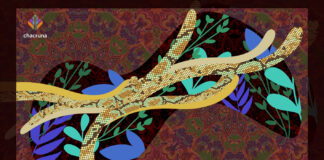Declaration of The 4th Brazilian Indigenous Ayahuasca Conference
The Fourth Indigenous Ayahuasca Conference met in September 2022 in Brazil. At the conference, Indigenous members crafted a letter outlining their opinions and desires concerning Indigenous nations, as well as ayahuasca use and management.
The Navajo Nation to Protect the Sanctity of Azeé – Peyote...
MEDIA CONTACTSAlray Nelson, Communications Director Kyron Hardy, Public Information Officer Kolton Nephew, Legislative Staff Writer E-mail: [email protected] Phone: (928) 565-0440
FOR IMMEDIATE RELEASE: May 26,...
A Medicine Heritage of 160 Indigenous Peoples: The Origins of Ayahuasca...
This brief and powerful history of Indigenous practices with ayahuasca before its globalization emphasizes the loss that has (and continues) to occur within these Indigenous communities. It also remarks on the importance of honoring and including Indigenous voices in the conversations being had as ayahuasca and other plant medicines gain popularity within the Western scientific sphere.
Calling on Federal, State, and Local Governments to Protect and Respect...
This resolution, which was put together by the National Congress of American Indians Executive Committee, puts forth policies that have been in place in regards to Native Americans and the sacred use of peyote, as well as resolutions they are putting forth regarding their opposition of the legalization and decriminalization of Peyote at the federal, state, and local government levels.
Wilma Mahua Campos, Shipibo Ayahuasquera
Since a young age, Wilma Mahua Campos has been dedicated to learning about her Shipibo culture's medicine, including the use of ayahuasca.
Terminally Ill Patients Sue DEA for Psilocybin Treatment Under Right to...
“The Right to Try Act” gives patients with life-threatening diseases a way to access investigational drugs that are not yet approved by the FDA. The Advanced Integrative Medical Science Institute, a Seattle-based palliative care clinic, has partnered with a patient rights attorney to appeal the DEA to be able to provide psilocybin-assisted therapy for two of their patients with life-threatening diseases.
Open Letter to the Psychedelic Movement Regarding Peyote in Policy Efforts...
The Indigenous Peyote Conservation Communication Committee wrote a letter to the psychedelic community regarding the inclusion of Peyote in decriminalization measures. This letter provides context, history, and details about Native Americans’ relationship with Peyote, the Native American Church, and NAC’s conservation efforts, and also includes suggestions of how psychedelic and decriminalization movements can be an ally to Native American communities.
Blessings of Life and Peyote with Debi Roan
Sean Lawlor interviews Debi Roan, psychedelic educator and holder of Navajo lineage, about the Peyote Way Church, sacred Navajo plant medicine ceremonies, the Salt Lake Psychedelic Therapy Training Program, psilocybin mushroom research at Johns Hopkins, and respectfully bridging indigenous traditions and rituals with Western science.
Let’s Talk About Hikuri: A Peyote Conservation Project by the Wixárika
This article introduces the Hablemos del Hikuri peyote conservation project that began in 2017 to research and put into action peyote conservation within Wixarika communities. Its co-founders, Lisbeth Bonilla and Pedro Nájera present the interdisciplinary and intercultural approach this project has toward finding a solution to peyote’s endangered status.
Innovating Native American Health Care Using Culture and Technology With Sutton...
Maria Mocerino interviews Sutton King, an afro-indigenous activist that is inno-vating Native health care services and building sustainable businesses for Native and Indigenous peoples. As the former Director of the New York City Federal Ur-ban Indian Health Program, King gives us a inside look at Native American health care, growing up as a Native American activist, the history of Native Americans through the lens of erasure and health care, bringing Natives direct services through Urban Indigenous Collective, and building Shock Talk; an app to con-nect Natives to culture, community, and therapists.














